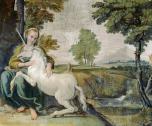Posted on January 17, 2015, and tagged as
I know you're saying, "Wait a minute, deacon. Everyone knows angels have wings. In every painting I've seen, every Christmas ornament or Valentine card out there, they have them. And Scripture says so."
Still, angels do not have wings.
To understand why they don't have wings, we have to know what an angel is. An angel is a creature of pure spirit created by God. As pure spirit they are not made of matter. You can't find hydrogen, oxygen or any other element on them. They don't have fat, protein or carbohydrates, and so they live without spit or arms or brain or wings for that matter. But as pure spirit, they are personal and immortal, and they have intelligence and will.
That makes them different from you and me in a sense. We can lose a tooth, color our hair or get a heart transplant. As material beings, we have parts and we change physically over time.
Still, we share something important with angels. Our soul is created spirit subject to the same no-parts, unchangeable, immaterial nature. Spirit is the part of our being that knows and loves, and so both angels and we are endowed by God to know and love, created specifically for knowing and loving God.
So if angels aren't material (just as our souls aren't material) and can't have wings, why does Isaiah say: "I saw … Seraphim … each of them had six wings: with two they covered their faces, with two they covered their feet, and with two they hovered"? (The Seraphim are a kind of angel.)
Isaiah, like an artist depicting angels in a Scripture scene or Valentine's card, uses a literary technique called anthropomorphism to depict an encounter with God in terms we can imagine.
The meaning of the Seraphim's actions is what's important: they hid their faces before God. Isaiah's message to his readers about humanity's relationship to God is one we hear through the Old Testament: nobody can see God and live.
But whether angels have wings or not is less important than our relationship to them as God's creatures and members of the Church. Throughout our lives we are surrounded by their watchful care and intercession. And it's from the angels (the Seraphim specifically) that we get the beginning of the Sanctus, one of the most beautiful and ancient hymns in the liturgy: "Holy, Holy, Holy Lord God of hosts. Heaven and earth are full of your glory.”
This originally appeared in the Church of St. Monica's weekly bulletin.







